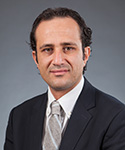Research Highlights
Cardiology Research: Pill vs. Procedure
Heart failure and atrial fibrillation—a form of irregular heartbeat—affect many older adults and frequently appear together. Treatment for atrial fibrillation often includes a rhythm-regulating drug such as amiodarone, which works by relaxing the heart but can also cause a long list of serious adverse effects including shortness of breath, fainting and memory problems.

Dr. Luigi Di BiaseIn a new multicenter study of more than 200 patients with heart failure and atrial fibrillation, a procedure called catheter ablation provided superior long-term results versus the most commonly prescribed medicine. In the study, one group took the drug amiodarone while a second group underwent catheter ablation, a surgical procedure in which doctors thread thin, flexible wires into the heart through blood vessels in the arm, groin or neck. The wires deliver energy or heat that destroys the heart tissue where the abnormal heart rhythm originates.
Dr. Luigi Di Biase, associate professor of medicine (cardiology) at Albert Einstein College of Medicine, presented the study’s findings at the American College of Cardiology’s scientific sessions in March.
He reported that:
- After two years of follow-up, 71 percent of patients treated with catheter ablation were free of atrial fibrillation, the study’s primary endpoint, compared with only 34 percent of patients who took amiodarone.
- Only 31 percent of patients receiving ablation were subsequently hospitalized, compared to 57 percent of patients taking amiodarone.
- Only 8 percent of patients receiving ablation died during the course of the study, compared to 18 percent of patients taking amiodarone.
“Catheter ablation is an effective alternative treatment to therapy with amiodarone,” said Dr. Di Biase, who is also a cardiologist and electrophysiologist at Montefiore, the University Hospital and academic medical center for Einstein. Like any surgical procedure, catheter ablation can carry risks—such as cardiac perforation and stroke—but the American Heart Association reports adverse effects affect only about 4 percent of those who undergo the procedure. “Overall, we found that catheter ablation is a better treatment than amiodarone,” said Dr. Di Biase.
About 5 million Americans have heart failure, a condition in which the heart cannot pump enough blood to meet the body’s needs. An estimated 5.6 million U.S. adults have atrial fibrillation. Patients with both conditions are at especially high risk of serious complications and death.
Posted on: Tuesday, June 16, 2015



Tablet Blog